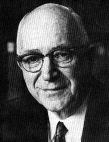Gordon Allport
| Gordon Allport | |
|---|---|

Gordon Allport
|
|
| Born | November 11, 1897 Montezuma, Indiana |
| Died | October 9, 1967 (aged 69) Cambridge, Massachusetts |
| Nationality | United States |
| Fields | Psychology |
| Alma mater | Harvard |
Gordon Willard Allport (November 11, 1897 – October 9, 1967) was an American psychologist. Allport was one of the first psychologists to focus on the study of the personality, and is often referred to as one of the founding figures of personality psychology. He contributed to the formation of Values Scales and rejected both a psychoanalytic approach to personality, which he thought often went too deep, and a behavioral approach, which he thought often did not go deep enough. He emphasized the uniqueness of each individual, and the importance of the present context, as opposed to past history, for understanding the personality.
Allport had a profound and lasting influence on the field of psychology, even though his work is cited much less often than that of other well-known figures. Part of his influence stemmed from his knack for attacking and broadly conceptualizing important and interesting topics (e.g. rumor, prejudice, religion, traits). Another part of his influence resulted from the deep and lasting impression he made on his students during his long teaching career, many of whom went on to have important careers in this science. Among his many students were Jerome S. Bruner, Anthony Greenwald, Stanley Milgram, Leo Postman, Thomas Pettigrew, and M. Brewster Smith. His brother Floyd Henry Allport, was professor of social psychology and political psychology at Syracuse University's Maxwell School of Citizenship and Public Affairs (in Syracuse, New York, USA) from 1924 until 1956, and visiting professor at University of California, Berkeley. A Review of General Psychology survey, published in 2002, ranked Allport as the 11th most cited psychologist of the 20th century.
Allport was born in Montezuma, Indiana, the youngest of four sons of John Edwards and Nellie Edith (Wise) Allport. When Gordon was 6 years old, the family had moved many times and finally settling in Ohio. His early education was in the public schools of Cleveland, Ohio, where his family moved when he was six years old. His father was a country doctor with his clinic and hospital in the family home. Because of inadequate hospital facilities at the time, Allport's father actually turned their home into a makeshift hospital, with patients as well as nurses residing there. Gordon Allport and his brothers grew up surrounded by their father's patients, nurses, and medical equipment, and he and his brothers often assisted their father in the clinic. Allport reported that "Tending office, washing bottles, and dealing with patients were important aspects of my early training" (p. 172). During this time, Allport's father was encapsulated in a blurb in Samuel Hopkins Adams' expose in Collier's Magazine on fraudulent medicinal cures, later reprinted as the book The Great American Fraud: Articles on the Nostrum Evil and Quackery. While much of the book focuses on large scale, heavily advertised patent medicines available at the turn of the century, the author states Allport "would never have embodied this article were it not for the efforts of certain physicians of Cleveland." Allport was criticized for diagnosing and treating morphine addicts via mail simply on the basis of letters and no in-person appointments. Upon receiving Adams' letter detailing his concocted affliction, Allport replied back via mail, diagnosing Adams as a morphine addict and sending doses of the "Dr. J. Edward Allport System," designed to cure morphine addicts. Analysis of the medicine revealed its active ingredient to be nothing more than additional morphine, packed with a bottle of pink whiskey "to mix with the morphin[sp] when it gets low." Adams referred to Allport as a "[quack] who pretend[s] to be a physician," is "no less scoundrelly," and "is even more dangerous" than other fraudulent addiction cure peddlers mentioned earlier in the book.
...
Wikipedia
